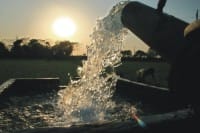Food and water

Photo: Azizur Rahim peu / DrikNews
Irrigation, which consumes far more water than any other activity, has generated enormous benefits. By helping to raise farmers' yields and stabilising food production and prices, irrigation has been key to achieving food security in many parts of the world. About 250 million hectares are irrigated worldwide today. Yet, inappropriate water and agricultural policies and poor irrigation management have lowered groundwater tables, damaged soils, and reduced water quality. Moreover, growing populations with rising incomes will further increase the demand for irrigation water to meet food needs. Although the domestic and industrial sectors use far less water than agriculture, water consumption in these sectors is also growing rapidly. And the importance of reserving water for environmental purposes has only recently been recognised: during the 20th century, more than half the world's wetlands were lost. Even as demand for water by all users grows, groundwater is being depleted, other water ecosystems are becoming polluted and degraded, and developing new sources of water is getting more costly. Many people are concerned that water will be the main obstacle to growing enough food in the coming decades. The strategies for national governments, international donors, and water users for the ensuring food production through proper use of water are-
Increasing the supply of water for farmers, households, and industries by investing in infrastructure.
Conserving water and making existing systems more efficient by reforming water management policy and investing in improved technology in these systems.

 For all latest news, follow The Daily Star's Google News channel.
For all latest news, follow The Daily Star's Google News channel. 




Comments